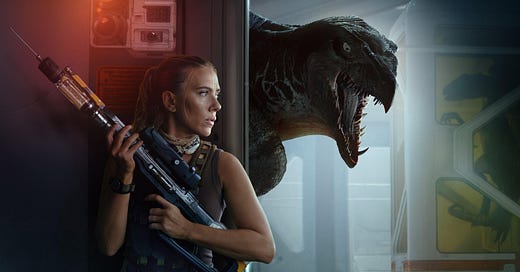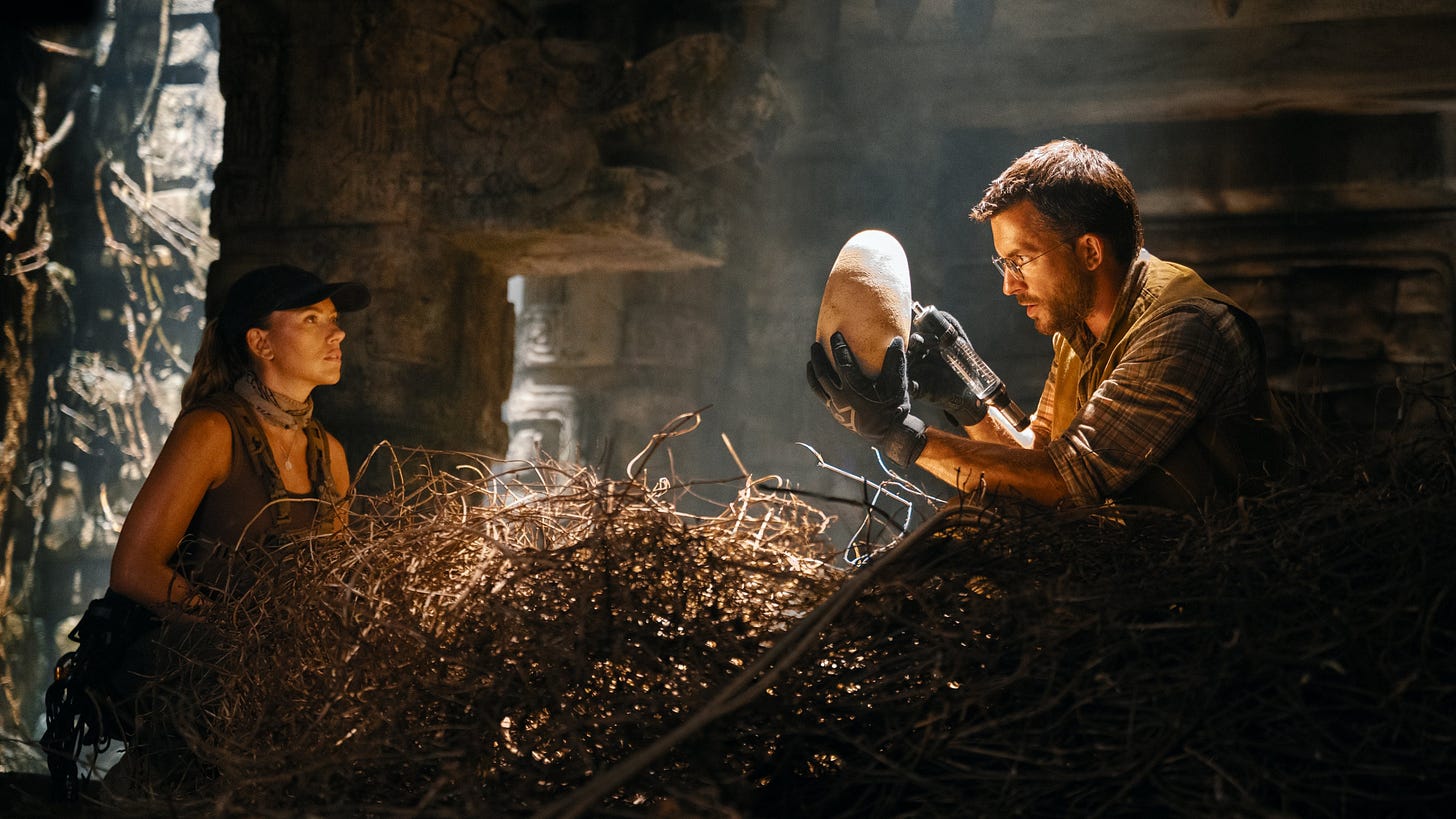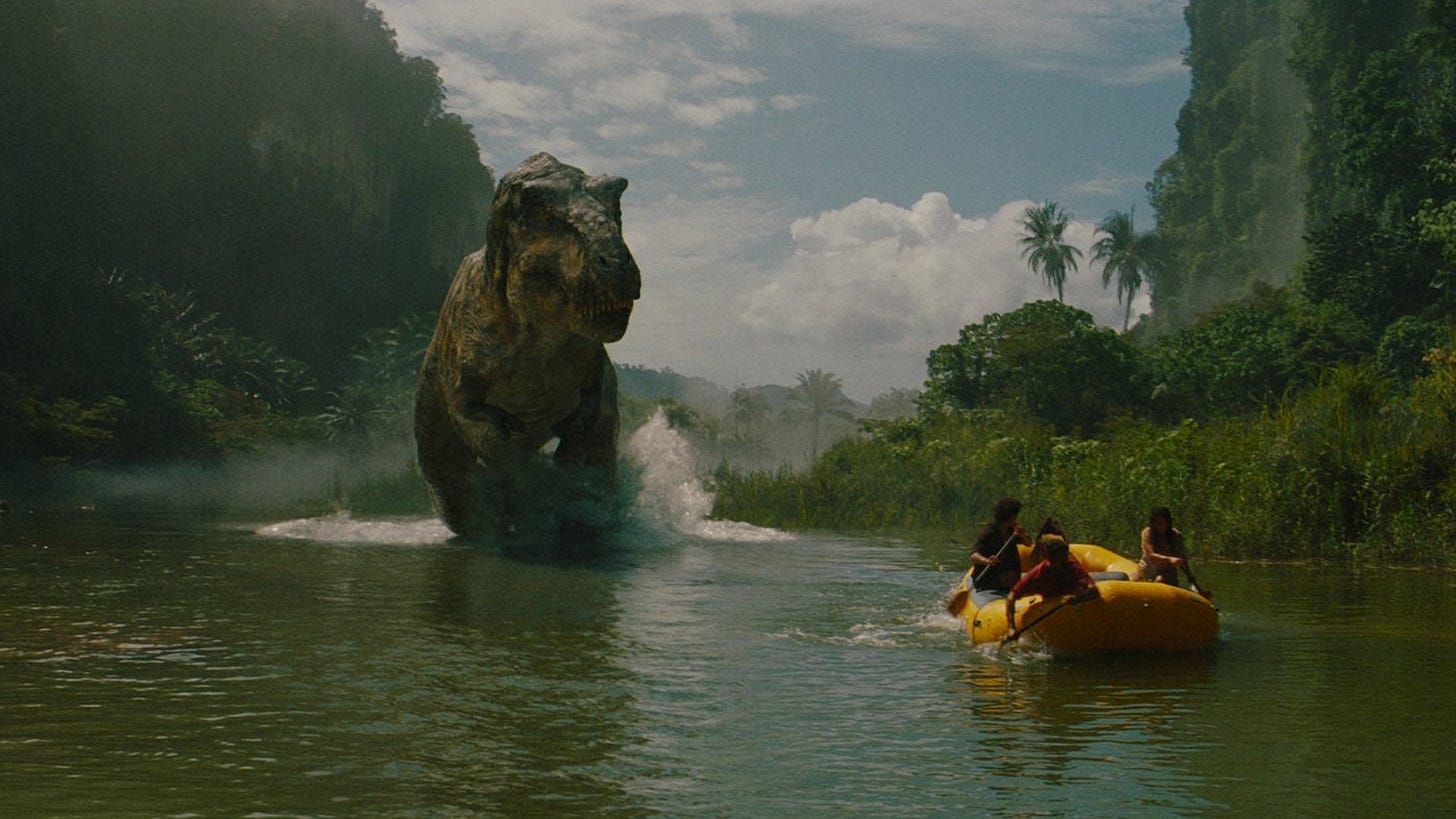Crítica em português
O meu sobrinho, que aniversariou ontem, adorava dinossauros quando criança. Além de colecionar miniaturas de tiranossauro, brontossauro, pterodátilo etc., conversava e explicava sobre cada um deles. Eu me enxergava no meu sobrinho, lembrava de minha infância e do meu fascínio com aquelas criaturas majestosas e assustadoras, e eu ainda viajava mais quando recordava as séries setentistas e oitentistas, tipo O Elo Perdido, ou o clássico Jurassic Park (1999), de um diretor que sabia muito bem conciliar a infância e a arte do cinema, o medo e o fascínio: Steven Spielberg. De certa forma, acredito que todos nós nutrimos um sentimento conflitante em relação aos dinossauros em algum momento de nossas vidas. Um desejo impossível (por ora) de assisti-los na natureza e o medo que inspirariam. Um sentimento explorado pela arte e materializado através de efeitos visuais, de animatronics e do trabalho de artistas plásticos, como o icônico Ray Harryhausen.
Tal tradição cinematográfica secular1 culminou neste Jurassic World: Recomeço. Como o próprio título afirma, é o reboot/sequência da trilogia protagonizada por Chris Pratt, que, a seu tempo, é o reboot/sequência legado da trilogia criada, dirigida ou produzida por Steven Spielberg. Há muitíssimo pouco que restou da infusão da fantasia e horror, só a reciclagem de dramas e conflitos individuais e coletivos. Quer ver? Martin Krebs (Rupert Friend) é o executivo de uma empresa farmacêutica que planeja obter o sangue de espécies gigantescas para desenvolver medicamentos que previnam ou impeçam as doenças coronarianas. Bonito, não? Mas Krebs não é altruísta, nem quer que o mundo seja um local melhor, só é mais um capitalista que quer enriquecer trilhões - o clássico vilão dessa série de filmes. Krebs contrata Zora (Scarlett Johansson, talvez em seu pior papel), uma mercenária ‘lara croftiana’ que aceita um pagamento multimilionário para liderar a equipe que ainda tem o capitão Duncan (Mahershala Ali), o paleontólogo Dr. Loomis (Jonathan Bailey) e alguns outros gatos pingados cuja irrelevância é a desculpa para serem feitos de petiscos de dinossauros (e dos espectadores, cujo entretenimento alimenta-se de suas mortes cinematográficas).
Não bastasse o roteiro derivado que leva os personagens à floresta na linha equatorial, o habitat que restou para abrigar os répteis, no meio do caminho ainda há uma família aventureira encabeçada por um pai (Manuel Garcia-Rulfo), suas filhas e seu encostado genro que são atacados por um mosassauro e ficam à deriva, até serem resgatados (ou “resgatados”) pela equipe de Krebs, e levados rumo à ilha dos dinossauros. Escrito por David Koepp, o mais comercial dos roteiristas em atividade (são deles Homem-Aranha, Jurassic Park, Missão: Impossível, Anjos e Demônios etc.), o roteiro deste reboot é péssimo - não emprego a palavra levianamente - no esforço de articular histórias paralelas, que só se enfraquecem mutuamente, de uma maneira previsível. Enquanto a trajetória da equipe de Krebs é gamificada - eles precisam obter amostras de três dinossauros antes de chegarem no ponto de resgate -, a da família Delgado é de exploração da natureza e de perigos cinematograficamente superáveis, pois não há viva alma corajosa que seria capaz de sacrificar um pai amoroso ou suas filhas, nem mesmo o genro, que pode ser o que for, mas não é covarde. A única pessoa que faria isso seria Spielberg, e mesmo este se arrepende de ter sacrificado a criança em Tubarão.
Assim, Jurrassic World: O Recomeço é só um amontoado de encontros com dinossauros, mal organizados dentro da estrutura narrativa, e protagonizados por personagens cuja descartabilidade é reconhecida com a mesma facilidade que um brontossauro pode ser avistado na cidade de Nova York. É um filme que nem explora os personagens, nem os espaços, nem mesmo os dinossauros, empregando-os com a mesma ganância utilitária de um Krebs: eles servem para aquela cena, e fim. Aí entram velhos conhecidos, tipo o T-Rex, na cena que me levou mais perto do original, e os Velociraptors, até os novatos, a maioria deles mutações criadas em laboratório. Uma destas mutações, o D-Rex (até a criatividade está em falta), deveria ser uma criação saída de um filme de horror, mas só é igualmente reciclado. Enquanto eu assistia ao ataque do mosassauro em alto mar, eu recordava com saudades de Godzilla Minus One; já enquanto os personagens pairavam diante daqueles seres, eu viajei a filmes B da minha infância ou aos recentes filmes de King Kong e Godzilla, com a diferença de que estes assumiam o que desejavam alcançar.
O diretor Gareth Edwards é o elo perdido: ele dirigiu Monstros (2010) e Godzilla (2014), que reiniciou a franquia do rei dos monstros, com uma seriedade incompatível com a chacota que é este episódio (no papel, pelo menos). E se dou crédito a Edwards, é por ter sido o responsável por Rogue One, um dos melhores episódios de Star Wars, porém não há nada que possa fazer aqui. Jurassic World sequer é medíocre, como a trilogia de antes, é ruim mesmo. Onde eu mencionei fascínio e medo, não há nem um, nem outro. O fascínio é a cópia carbono do encontro do Dr. Grant com os brontossauros (será que alguns mais jovens saberão o que é cópia carbono?, reflito); já o medo é inexistente. Se a série estabeleceu o ataque dos velociraptors no original ou do T-Rex, em O Mundo Perdido, como o modelo a partir do qual fabricar tensão e pavor em um cenário PG-13, Edwards acelera a ação para chegar logo no clímax, sem saber administrar o tempo de suspense, e esconde as mortes fora de campo. O medo não é construído ou trabalhado, vira a hipótese: imaginem se estivéssemos diante de dinossauros…
No restante do tempo, os atores tentam conferir dimensão a seus personagens planos: Scarlett Johansson não sabe se mantém uma seriedade que deveria nortear as ações de sua personagem ou se está piscando os olhos para o espectador, em uma atuação que me deu saudades da de Chris Pratt, que ao menos tentou interpretar um personagem distante de sua persona (se teve êxito, aí é outra história). Já Rupert Friend e Jonathan Bailey são estereótipos do estereótipo: o executivo malvado e a cara de um capitalismo selvagem, que quer ‘salvar’ os doentes cardíacos, enquanto deixa os outros morrerem diante dele; o cientista idealista, que sonha em poder disponibilizar a cura para todos sem preço adicional. Quem escapa ileso (não necessariamente do filme), mesmo com um personagem superficial, é Mahershala Ali, e é maravilhoso enxergar um ator que, com um único olhar, torna acessível a nós toda a dor e o arrependimento que carrega dentro dele.
Já Manuel Garcia-Rulfo, David Iacono, Luna Blaise e Audrina Miranda merecessem, talvez, um filme somente deles. A trama da família, em uma viagem a barco, a fim de se despedir da filha mais velha que irá estudar em Nova York, e que procura um modo de sobreviver em um ambiente hostil é inédita dentro da série de filmes e poderia até trazer um olhar igual ao de Spielberg. Em vez da crítica capitalista rasteira - e que não cola, vindo de um estúdio que provavelmente arrecadará U$ 1 bilhão com este filme -, ou do conflito entre tornar real e presente o que é fóssil e passado, talvez teríamos um reencontro com o medo e fascínio que tais criaturas provocam. Mas, dentro de Jurassic World, a trajetória de sobrevivência da família é só um engodo, que quebra o ritmo da trama central e, como tudo no filme, é um elemento utilitário para que este ou aquele personagem revelem quem de fato são.
Talvez fosse uma boa ideia deixar os dinossauros descansando enquanto esperam uma ideia melhor para serem ressuscitados.
English review
My nephew, who celebrated his birthday yesterday, loved dinosaurs as a child. In addition to collecting miniatures of tyrannosaurus, brontosaurus, pterodactyls, etc., he would talk and explain about each one of them. I saw myself in my nephew, I remembered my childhood and my fascination with those majestic and frightening creatures, and I traveled even more when I remembered the series from the seventies and eighties, like The Missing Link, or the classic Jurassic Park (1999), by a director who knew very well how to reconcile childhood and the art of cinema, fear and fascination: Steven Spielberg. In a way, I believe that we all have had conflicting feelings about dinosaurs at some point in our lives. An impossible desire (for now) to see them in the wild and the fear they would inspire. A feeling explored through art and materialized through visual effects, animatronics and the work of visual artists, such as the iconic Ray Harryhausen.
This centuries-old cinematic tradition culminated in this Jurassic World: Rebirth. As the title itself states, it is the reboot/sequel of the trilogy starring Chris Pratt, which, in its time, is the reboot/sequel legacy of the trilogy created, directed or produced by Steven Spielberg. There is very little left of the infusion of fantasy and horror, only the recycling of individual and collective dramas and conflicts. Want to see? Martin Krebs (Rupert Friend) is the executive of a pharmaceutical company that plans to obtain the blood of gigantic species to develop drugs that prevent or stop coronary diseases. Nice, huh? But Krebs is not altruistic, nor does he want the world to be a better place; he is just another capitalist who wants to enrich trillions - the classic villain of this series of films. Krebs hires Zora (Scarlett Johansson, in perhaps her worst role), a ‘Lara Croftian’ mercenary who accepts a multimillion-dollar payment to lead the team that also includes Captain Duncan (Mahershala Ali), paleontologist Dr. Loomis (Jonathan Bailey) and a few other random characters whose irrelevance is the excuse for them to be used as dinosaur snacks (and for the viewers, whose entertainment is fueled by their cinematic deaths).
As if the derivative script that takes the characters to the forest on the equator, the habitat that remains to shelter the reptiles, weren’t enough, along the way there’s also an adventurous family headed by a father (Manuel Garcia-Rulfo), his daughters and his son-in-law who are attacked by a mosasaur and are left adrift, until they are rescued (or “rescued”) by Krebs’ team, and taken to the island of the dinosaurs. Written by David Koepp, the most commercial of the active screenwriters (his works include Spider-Man, Jurassic Park, Mission: Impossible, Angels and Demons, etc.), the script for this reboot is terrible - I don't use the word lightly - in its effort to articulate parallel stories that only weaken each other in a predictable way. While the trajectory of Krebs' team is gamified - they need to obtain samples from three dinosaurs before reaching the rescue point -, that of the Delgado family is one of exploration of nature and cinematically surmountable dangers, because there is no brave soul alive who would be capable of sacrificing a loving father or his daughters, not even his son-in-law, who may be whatever he is, but is not a coward. The only person who would do that would be Spielberg, and even he regrets having sacrificed the child in Jaws.
Thus, Jurassic World: The Aftermath is just a bunch of encounters with dinosaurs, poorly organized within the narrative structure, and starring characters whose disposability is recognized as easily as a brontosaurus can be spotted in New York City. It is a film that neither explores the characters, nor the spaces, nor even the dinosaurs, employing them with the same utilitarian greed as a Krebs: they serve for that scene, and that's it. Then old acquaintances come in, like the T-Rex, in the scene that brought me closer to the original, and the Velociraptors, and the new ones, most of them mutations created in a laboratory. One of these mutations, the D-Rex (even creativity is lacking), should be a creation straight out of a horror film, but it is just as recycled. While I watched the mosasaur attack on the high seas, I fondly remembered Godzilla Minus One; While the characters hovered before those beings, I traveled back to B movies from my childhood or to the recent King Kong and Godzilla films, with the difference that these assumed what they wanted to achieve.
Director Gareth Edwards is the missing link: he directed Monsters (2010) and Godzilla (2014), which rebooted the king of the monsters franchise, with a seriousness incompatible with the mockery that this episode is (on paper, at least). And if I give credit to Edwards, it is for having been responsible for Rogue One, one of the best episodes of Star Wars, but there is nothing he can do here. Jurassic World is not even mediocre, like the trilogy from before, it's really bad. Where I mentioned fascination and fear, there's neither. The fascination is a carbon copy of Dr. Grant's encounter with the brontosaurus (I wonder if some younger people know what a carbon copy is?); the fear is nonexistent. If the series established the attack of the velociraptors in the original or the T-Rex in The Lost World as the model from which to create tension and dread in a PG-13 scenario, Edwards speeds up the action to get to the climax right away, without knowing how to manage the suspense, and hides the deaths off-screen. Fear is not constructed or worked on, it becomes a hypothesis: imagine if we were facing dinosaurs…
The rest of the time, the actors try to give dimension to their flat characters: Scarlett Johansson doesn't know whether to maintain a seriousness that should guide her character's actions or whether she is winking at the viewer, in a performance that made me miss Chris Pratt's, who at least tried to play a character far from his persona (whether he succeeded is another story). Rupert Friend and Jonathan Bailey are stereotypes of the stereotype: the evil executive and the face of a wild capitalism, who wants to 'save' heart patients, while letting others die in front of him; the idealistic scientist, who dreams of being able to make a cure available to everyone at no extra cost. The one who escapes unscathed (not necessarily from the film), even with a superficial character, is Mahershala Ali, and it is wonderful to see an actor who, with a single look, makes all the pain and regret he carries inside him accessible to us.
Manuel Garcia-Rulfo, David Iacono, Luna Blaise and Audrina Miranda perhaps deserve a film all their own. The plot of the family, on a boat trip to say goodbye to their eldest daughter who will study in New York, and who searches for a way to survive in a hostile environment is unprecedented in the film series and could even bring a perspective similar to Spielberg's. Instead of the shallow capitalist criticism - which doesn't stick, coming from a studio that will probably earn $1 billion with this film -, or the conflict between making real and present what is fossil and past, perhaps we would have a re-encounter with the fear and fascination that such creatures provoke. But, in Jurassic World, the family's survival trajectory is just a deception, which breaks the rhythm of the central plot and, like everything in the film, is an outil for this or that character to reveal who they really are.
Maybe it would be a good idea to let the dinosaurs rest while they wait for a better idea to be resurrected.
O Mundo Perdido (The Lost World, 1925).









Concordo com sua crítica, só não concordo com a forma como colocou a palavra "capitalista". Ganância é totalmente diferente de capitalismo. Foi o capitalismo correto que possibilitou todos os filmes existirem, possibilitou você e todos nós termos acesso a assistir eles e existir esse aplicativo e todos os demais para que você pudesse realizar sua crítica e ser visto por milhares de pessoas. 😉